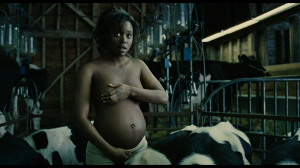Children of Men birthed a breathtaking style of action filmmaking. And whilst we can never be for sure what the future will bring until we actually live through it, leave it to the movies to ponder on the possibilities, both dark and optimistic.
A modern classic dystopian film, Alfonso Cuarón’s Children of Men throws us into a more worrisome future, but through its thrilling journey restores our faith in humanity and in hope itself.
Based on P.D. James’ novel The Children of Men, Cuarón’s political thriller brings us to a morose future in which women are no longer fertile and the UK is the only nation with at least a sliver of political “stability” left. We’re introduced to Clive Owen’ Theo, a former activist who 20 years after the death of his infant son now works at a boring desk job and finds solace only in his friend and weed dealer Jasper (Michael Caine in his most unique role).
Theo’s unexciting existence within the world crumbling around him is quick to change as he is kidnapped by a gang of terrorists who turn out to be led by a former love of his (and the mother of his deceased son), Julian (Julianne Moore). She asks him to talk to his government minister cousin Nigel (Danny Huston) so he can obtain transit papers for a refugee girl named Kee (Clare-Hope Ashitey).
The deal Theo makes with his cousin requires him to personally escort Kee, a job that brings Theo on a journey that will be one of the most important in human history. Kee, we learn, is the first woman to become pregnant in 18 years, and the terrorist organization (called “The Fishes”) Julian runs plans to bring Kee to the so-called “Human Project” which is soon to depart on a boat to the Azores in Portugal to research a cure to the fertility problem.
Children of Men essentially plays out as a flawlessly paced series of long-shot set-pieces that has Theo escorting Kee to safety with conflict arising from the interests of the Fishes, the government, and a variety of angry citizens and refugees rioting against the fascist establishment.
Emmanuel Lubezki’s cinematography, utilizing the continuous takes he would later apply to Gravity and Birdman, gives the film an exciting flow that makes it feel almost like an interactive video game. It’s a film about stealth and care and soldiering on through all the conflict and violence that surrounds Theo, Kee and their various other companions throughout the film, and Lubezki’s work accentuates the suspense of situations and the determination and faith of the characters.
The editing (by Cuarón and Alex Rodriguez) is also on point, crisp and direct but never too quick or too slow. The film unfolds like an elaborate stage play, with perseverant movement and characters moving in and out of frame while reacting to each other flawlessly. Cuarón and Lubezki craft a well-oiled machine that feels as organic as its biological subject material and grabs our attention to the point that we forget we’re watching Sci-Fi.
The work done by the actors is also immense, as physical as it is emotional and superb in both elements. The camera can follow a single unedited scene for four or five minutes at a time, often with two or three actions or dialogues or conflicts occurring simultaneously.
Set-pieces involving vehicular stunts and mobs of people are especially involving. The only single-take scene I’ve seen that is as gripping as an early car chase in Children of Men is the climactic action sequence in the recent Dawn of the Planet of the Apes, shot by another cinematographer that has worked with Cuarón.
The elaborate nature of the single-shot sequences suits Cuarón’s emotionally intense projects and the science fiction genre in general incredibly well, adding to the sense of scope and intensity that a film has, and in no film is it applied as well as in Children of Men”, a movie about the importance of one person and about the importance of all people.
There’s also substance to match the style, with political and social commentary about immigration, totalitarianism, anarchy, and the importance of life and faith abundant. Not everyone will relate to the little messages thrown about here and there - the author of the original novel is a conservative member of the House of Lords, after all - but the overlying message of the movie is something we can all relate to.
When Kee eventually has her child, the crowd of refugees fighting each other, the terrorists and the army stop to cry over their first sight of childhood in decades in one single respectful take. It’s one of the most beautiful scenes ever shown on film, celebrating the simple power of innocent youth and the beauty of motherhood, the necessity of protection and the power of hope and love with no forced emotion and no restraint.
Children of Men, like the best stories of its kind, is as much about now as it is about the future. Women may still be able to reproduce in our world, but life isn’t something we can take for granted. We may have wars and diseases and political issues plaguing our society, but we’re only going to solve them by persevering on, working together, and retaining that little bit of hope that we’ll be able to sort things out in the end.
Written by guest writer Cameron Johnson







